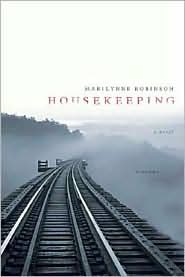Housekeeping
 In Moby Dick, there’s a long passage of meditation on the whiteness of the whale. Melville launches into a highly symbolic and metaphysical discussion of the concept of whiteness, and we’re left with a lasting impression of our smallness and impermanence in the vast sea of existence.
In Moby Dick, there’s a long passage of meditation on the whiteness of the whale. Melville launches into a highly symbolic and metaphysical discussion of the concept of whiteness, and we’re left with a lasting impression of our smallness and impermanence in the vast sea of existence.
Untangle Melville’s prose, giving him a voice less florid and more exact, poetic, and keenly observant; change the setting from the sea to a village on the bank of a glacial lake in the western U.S.; and give the forward momentum to trains and cars instead of ships; and you’ll have Marilynne Robinson’s first novel, Housekeeping.
The story opens with a train wreck. Crossing the bridge into the town of Fingerbone, a train veers off the track and plunges into the icy waters of a vast lake. The train could just as well be a metaphor for the human community in the novel, particularly the family of narrator Ruthie, her sister Lucille, and her aunt Sylvie. Their grandfather is on the wrecked train. Years later, Ruthie and Lucille’s mother joins him at the bottom of the lake when she drives her car off a cliff.The girls are left first in the care of their grandmother, then of two worrying great aunts, then, finally, their eccentric Aunt Sylvie, a transient whose stability as a caregiver is always in question because of her predisposition to dream and wander rather than to engage the practical realities of day-to-day life.
As we read, we have the sense that the real challenge is navigating the bridge without vanishing into the refractory depths of the lake, which suggests the eternal and the undefined. In the same way human history is a mysterious and complex deep that we read by arbitrarily choosing certain events and assigning patterns of causation, the lake hides much in its depths and permits us to see only its shifting, reflective surface. The characters live on the water — crossing it on trains and boats and bridges, fishing in it, enduring its floods in spring, passing many hours on the bank in recreation and escape. But it hides much of their history, and consequently their identity, in its depths.
Many of the terms Robinson uses to speculate about eternal things come from water. “Appearance paints itself on bright and sliding surfaces,” muses her narrator Ruthie at one point, “for example, memory and dream.” On the surface, she looks at her Aunt Sylvie brushing her hair, but her posture recalls Ruthie’s mother and in a twinkling she sees her instead. The individual self is projected on the surface of eternity, the scene seems to suggest, like a passing reflection on water. Elsewhere, Ruthie remarks that “everything that falls upon the eye is apparition, a sheet dropped over the world’s true workings.”
How do we live in this sense that there is always more than meets the eye? The novel offers at least two alternatives. One is to do what Ruthie’s sister Lucille does. Wearied by her aunt’s strange habits of sitting in the dark, collecting tin cans and cats and newspapers, and wandering off to sometimes dangerous places in the reverie of daydreams, Lucille turns to the ordinary life of the town. She gets interested in clothes and trends, and works to fit in with the other girls. Eventually she leaves, going to live with the home economics teacher. In effect, she jumps into the pool of the present, the community life of styles and social mores and “presentness” of everyday existence in Fingerbone. She rejects the brooding sensibility of her aunt and sister.
Sylvie and Ruth exemplify another way of orienting the self in a world where all planes of being — present and past, perceiver and perceived, individual self and surrounding world, life and death, loss and possession — seem to be always layered and always shifting. Rather than shutting down some of these channels, as Lucille does, they drift. They acknowledge none of the limitations and responsibilities of society, letting the house decay, skipping school, “borrowing” (stealing?) a boat to explore the further regions of the lake. They talk little and muse a lot. Eventually the town closes in on them, scheduling a hearing to challenge Sylvie’s guardianship, and the two escape in the darkness by crossing the railroad bridge out of town and living the rest of their lives as hobos. It might not sound all that appealing, yet they are the ones who successfully get across the bridge. In this way the novel seems to suggest that it’s best not to get too attached to our systems of making meaning, whether through institutions of thought or of society.
There are lots of reviews of Housekeeping over at Amazon, and those that defend it most passionately praise the writing in itself, extolling the beauty of the language. But who reads a novel for the language alone? Housekeeping is a book that demands a lot from its reader, but ultimately it’s not just beautiful words. It’s a challenge to consider the tensions and intersections we live in as creatures with both bodies and souls. “Every spirit passing through the world fingers the tangible and mars the mutable, and finally has come to look and not to buy,” Ruthie remarks at one point. Housekeeping explores the problem of ordering our inner worlds accordingly.





9 Comments
hopeinbrazil
A beautifully written review.
Carol in Oregon
I agree with Hope: this review is so well thought out and well written.
I read Housekeeping after several friends gave high praise to it. I hated it. So dark and dreary. I think the problem was me. I had a full plate of responsibilities and I wanted a book I could sit down with on a Friday night, a fun escape. Janette Oke, perhaps, would have been the better choice.
This summer my husband and I listened to Gilead and I was entranced by the writing, the imagery, Marilyn Robinson’s deft strokes. It made me reconsider Housekeeping. Maybe I should give it another chance.
Your review makes me feel the same way, reminds me that sometimes when I don’t “get” a book the problem is me, not the book.
Reading Till We Have Faces was another journey from repulsion to affection.
Thank you for this.
Carol in Oregon
**um, I was being sarcastic regarding Janette Oke. These days when I need something light and undemanding, I turn to children’s books.
Polly
Wow! You got a lot more out of that book than I did- not surprising :) I loved Gilead and Home but I did not like this book much. I had a hard time getting into it and didn’t really feel sympathy with any of the characters. Maybe like Carol I just wasn’t in the right frame of mind to appreciate it. I loved the other 2 so much though I hope she writes more….
GretchenJoanna
I have Housekeeping on my nightstand, maybe next in line after my current reading projects. It’s been so highly recommended by people I respect, I was glad to pick up a used copy a year ago. And I’m also glad to read your review before I tackle it, because I think it’s likely I wouldn’t have known how to appreciate the book without the very thoughtful observations/clues you’ve given here.
Sherry
I’m another who loved Gilead and Home and thought I might like this book. I started it,but did not finish. Maybe I need to take a second look.
Janet
I loved Gilead too. I agree that Housekeeping is a more difficult read.
Jess
Your book reviews are so interesting. This sounds like an incredibly complex book that you have so thoughtfully reviewed.
Alice@Supratentorial
I love Marilynne Robinson. I remember really liking Housekeeping although I’m pretty sure I could never have written such a beautiful review of it. I consider Gilead and Home two of the best books I’ve ever read.